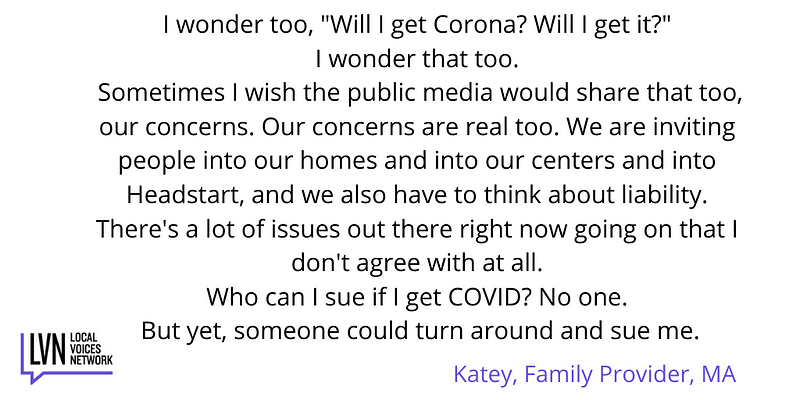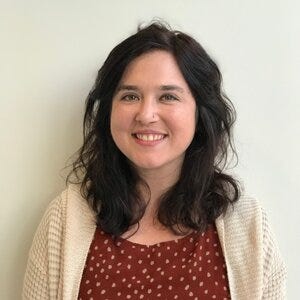
“I don’t know how you do it.” I cringe still thinking about saying that to a colleague last week, who called me from the car with their partner and two young kids. It’s a thoughtless cliche I’ve repeated since March to anyone who has been navigating COVID-19 with children. As a happily childless person in her early 30’s, what else is there for me to say? I don’t get it.

COVID seems to have set in stark relief our different living situations, making it harder to know what words of empathy to offer. Five months into quarantine and looking ahead to reopening, it also just seems like we’re just tired. The energy to empathize isn’t as readily available. While the stakes feel higher than ever, it gets harder to listen, to say you don’t know. To sit with nuance, complexity, and contradiction. In this moment, empathy — and its very real policy implications — is actually a life or death matter. Yet we aren’t listening to the people who actually teach us help us build that very muscle in our formative years: early education providers.
I’ve spent the last month talking to almost 20 early education providers about reopening in the midst of COVID-19, in five recorded conversations through my role as a project lead and facilitator at Local Voices Network. We partnered with the Massachusetts Association for the Education of Young Children to gather classroom teachers, trainers, case managers and family childcare providers. I was nervous, uncertain I would be able to relate. I asked more than a few dumb questions.
I was met with generosity and an outpouring of stories from women (yes, all the participants were women) who were confused, eager, angry, and above all, conflicted. They were concerned for their own families, and those of the children they care for. They worried for the other educators that had been furloughed, like Patty, who was one of 18 left when her center closed. When it reopened as an emergency center, five were brought back. They now operate with seven fulltime and one part-time, who also works as their cleaner. The decisions seemed impossible.
What if each morning meant deciding to show up for the children you care for each day or to protect your own? That’s essentially the choice that Tammy, a Headstart provider in Springfield, had to make last week, when her Headstart program reopened. With a husband battling a terminal illness, she decided to work virtually, swallowing a sense of guilt as she Zoomed with colleagues back in the classroom.
What about those for whom their home is the classroom? Family childcare providers are constantly navigating the jobs they love and the homes they want to protect. They’re rearranging space, saving for PPE and frantically trying to find the right cleaning supplies. Michelle, from Pittsfield, explained to me that she’s trying to figure out how, without renovation, her home can accommodate socially distanced children from 18 months to five years old. Jenny, a Headstart provider, works with children from families of at-risk populations like day laborers, and she isn’t sure if she should reopen or not. And Katey raised a critically important question about liability: “Who can I sue if I get COVID? No one. But someone can turn around and sue me.”
If I’ve learned anything about this field, it is not staffed by the faint of heart or the quick to complain. These women have innovated endlessly in spite of confusing, ever-shifting reopening requirements. They offered virtual storytime, toy show and tell, drive-by birthdays, and a field trip to the New England Aquarium — unsure of future enrollment, and thus their financial fate. They also held incredible empathy for those who in no small part would decide that: parents. Patty, as always, said it best. For people bound together by love and care, but also money and risk, I was moved to hear, “I don’t know what the right answer is, but let’s figure it out together.” I heard of parents donating back to a transitional kindergarten program in Arlington. I heard from a family childcare provider who donates food back to the parents whose children she cares for. Others cut their daily rates.
Early education providers certainly aren’t the only ones having to make incredibly difficult choices. The field is one of many in crisis. I think what made these conversations so emotional was the profound responsibility shouldered by these women, who know — even if no one is listening to them or paying them like it — how essential their work is critical to shaping how we engage with each other for years to come. I remember who those people were for me. Their work nurtures young minds to care about the welfare of others. Nicole, a transitional kindergarten teacher, shared how she educates her children about why we wear masks: to protect others.
Even if I don’t have kids, I want to live in a state that invests in strengthening our empathy muscles so they can keep working — especially when we’re tired. To do that, we have to listen to the people shaping us all at that early age, showing up for who we will become before we know. As the reopening debate intensifies, we have to do better — even if we don’t have kids in school — than “I don’t know how you do it.”
